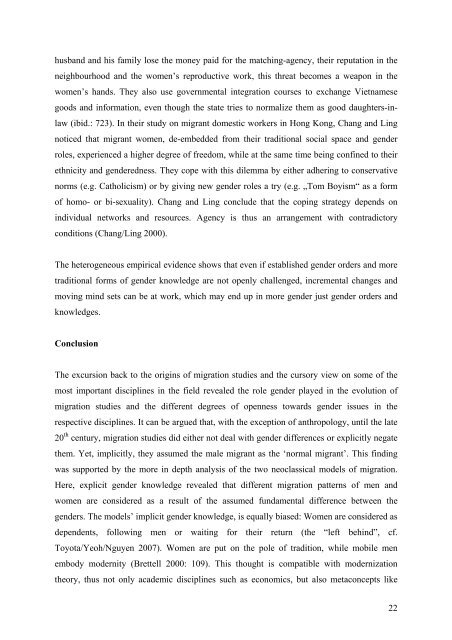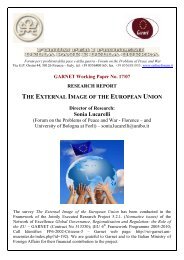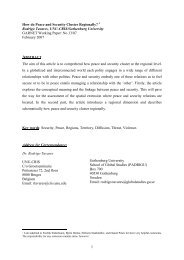1 Gender Knowledge in Economic Migration Theories and in - Garnet
1 Gender Knowledge in Economic Migration Theories and in - Garnet
1 Gender Knowledge in Economic Migration Theories and in - Garnet
You also want an ePaper? Increase the reach of your titles
YUMPU automatically turns print PDFs into web optimized ePapers that Google loves.
husb<strong>and</strong> <strong>and</strong> his family lose the money paid for the match<strong>in</strong>g-agency, their reputation <strong>in</strong> the<br />
neighbourhood <strong>and</strong> the women’s reproductive work, this threat becomes a weapon <strong>in</strong> the<br />
women’s h<strong>and</strong>s. They also use governmental <strong>in</strong>tegration courses to exchange Vietnamese<br />
goods <strong>and</strong> <strong>in</strong>formation, even though the state tries to normalize them as good daughters-<strong>in</strong>law<br />
(ibid.: 723). In their study on migrant domestic workers <strong>in</strong> Hong Kong, Chang <strong>and</strong> L<strong>in</strong>g<br />
noticed that migrant women, de-embedded from their traditional social space <strong>and</strong> gender<br />
roles, experienced a higher degree of freedom, while at the same time be<strong>in</strong>g conf<strong>in</strong>ed to their<br />
ethnicity <strong>and</strong> genderedness. They cope with this dilemma by either adher<strong>in</strong>g to conservative<br />
norms (e.g. Catholicism) or by giv<strong>in</strong>g new gender roles a try (e.g. „Tom Boyism“ as a form<br />
of homo- or bi-sexuality). Chang <strong>and</strong> L<strong>in</strong>g conclude that the cop<strong>in</strong>g strategy depends on<br />
<strong>in</strong>dividual networks <strong>and</strong> resources. Agency is thus an arrangement with contradictory<br />
conditions (Chang/L<strong>in</strong>g 2000).<br />
The heterogeneous empirical evidence shows that even if established gender orders <strong>and</strong> more<br />
traditional forms of gender knowledge are not openly challenged, <strong>in</strong>cremental changes <strong>and</strong><br />
mov<strong>in</strong>g m<strong>in</strong>d sets can be at work, which may end up <strong>in</strong> more gender just gender orders <strong>and</strong><br />
knowledges.<br />
Conclusion<br />
The excursion back to the orig<strong>in</strong>s of migration studies <strong>and</strong> the cursory view on some of the<br />
most important discipl<strong>in</strong>es <strong>in</strong> the field revealed the role gender played <strong>in</strong> the evolution of<br />
migration studies <strong>and</strong> the different degrees of openness towards gender issues <strong>in</strong> the<br />
respective discipl<strong>in</strong>es. It can be argued that, with the exception of anthropology, until the late<br />
20 th century, migration studies did either not deal with gender differences or explicitly negate<br />
them. Yet, implicitly, they assumed the male migrant as the ‘normal migrant’. This f<strong>in</strong>d<strong>in</strong>g<br />
was supported by the more <strong>in</strong> depth analysis of the two neoclassical models of migration.<br />
Here, explicit gender knowledge revealed that different migration patterns of men <strong>and</strong><br />
women are considered as a result of the assumed fundamental difference between the<br />
genders. The models’ implicit gender knowledge, is equally biased: Women are considered as<br />
dependents, follow<strong>in</strong>g men or wait<strong>in</strong>g for their return (the “left beh<strong>in</strong>d”, cf.<br />
Toyota/Yeoh/Nguyen 2007). Women are put on the pole of tradition, while mobile men<br />
embody modernity (Brettell 2000: 109). This thought is compatible with modernization<br />
theory, thus not only academic discipl<strong>in</strong>es such as economics, but also metaconcepts like<br />
22





